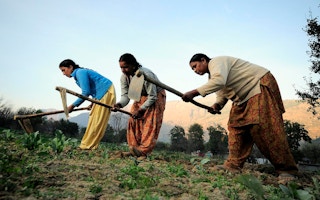The upheaval that dominated the Green Climate Fund (GCF) Board Meeting in Songdo, South Korea earlier this month needs to be seized on as an opportunity to make urgently needed reforms.
Crucial decisions were put on hold—and not for the first time. These included the approval of US$1 billion-worth of projects to help vulnerable countries mitigate and cope with the impacts of climate change and address the US$2 billion climate finance shortfall following the Trump administration’s decision to withdraw its promised contribution. Clearly radical reform is needed.
The UN’s Green Climate Fund, though not the only administer of climate finance, is pivotal to developed countries meeting their commitments to provide US$100 billion a year by 2020. And for making it possible for developing countries to implement the programmes needed to develop and even thrive in a climate changing world.
The GCF’s governance structure was designed to be egalitarian and inclusive with equal representation on the board, and for decisions to be made by representatives from developed and developing countries. It also provides for observers from non-governmental organisations and from the private sector. However, its efficiency and effectiveness are hindered by a complex political structure in which too much of its decision-making rests with board members making the whole process lengthy and political that has resulted in indecision, repeated delays and mismanagement.
To be more effective, the GCF needs to devolve how decisions are made. This includes giving independent expert groups, working groups and particularly the GCF secretariat more authority. Giving these bodies a stronger role will help prevent the backlog that too often delays important decisions. It would also leave the board free to focus on the GCF’s policy and effectiveness. This includes refining investment criteria and accreditation procedures, increasing the efficiency and effectiveness of how money is disbursed, and enable it to define the criteria for overseeing how portfolios perform.
“
Now is the perfect time to redefine how the institution builds developing countries’ capabilities in order to increase their ability to implement climate finance and develop climate-resilient low-carbon economies. There is no more time to waste.
The GCF’s effectiveness could be further increased by defining different categories of decision-making for different bodies, making it clear which decisions the board, working groups and secretariat would be responsible for depending on the level of importance.
As well as devolving decisions made within the GCF’s headquarters in South Korea, developing countries also need to be able to decide what types of projects they finance.
Research from the International Institute for Environment and Development (IIED) found that less than US$1 in US$10 from dedicated climate funds is committed for local projects.
In 2016, the GCF created the enhanced direct access (EDA) initiative to do just this. But, so far only two EDA pilot projects have been adopted. This is despite its aim to make sure projects better reflect people’s priorities on the ground, strengthen countries’ decision-making authority over resources, and transparency. The majority of funds continue to be channelled to large projects through international development banks and UN agencies. Now is the perfect opportunity to make sure devolution is thoroughly implemented—internally and externally.
Millions of women, children and men in developing countries are already struggling with the impacts of climate change. The GCF’s failure to make decisions this month is delaying important projects. Now is the perfect time to redefine how the institution builds developing countries’ capabilities in order to increase their ability to implement climate finance and develop climate-resilient low-carbon economies. There is no more time to waste.
Neha Rai specialises in public policy analysis, urban and regional planning, and climate finance at the London-based International Institute for Environment and Development. This story was published with permission from Thomson Reuters Foundation, the charitable arm of Thomson Reuters, that covers humanitarian news, women’s rights, corruption and climate change. Visit news.trust.org.











